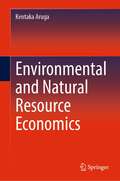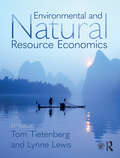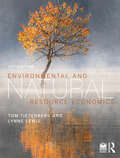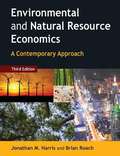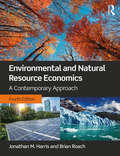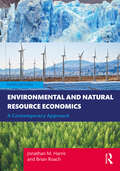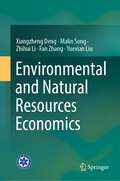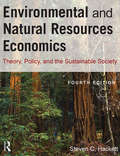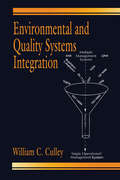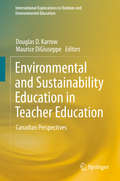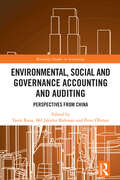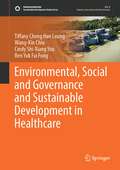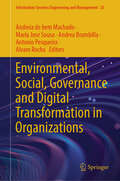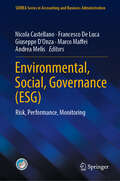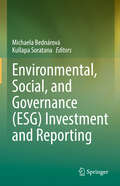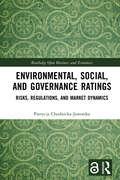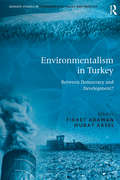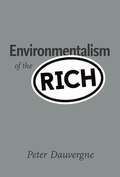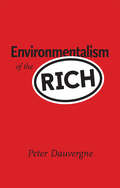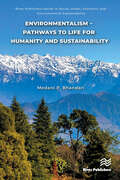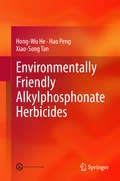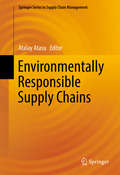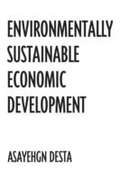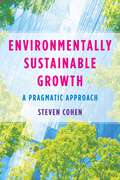- Table View
- List View
Environmental and Natural Resource Economics
by Kentaka ArugaThis textbook discusses environmental and natural resource economics. It presents foundational knowledge for applying economics to understand environmental economics as well as for managing environmental problems and optimizing the level of natural resource extraction. Environmental and Natural Resource Economics bridges knowledge between the major natural environmental issues and which economic policies could be applied for reducing human impacts on such issues. It is distinctive from other environmental economics textbooks by covering not only basic concepts introduced in environmental economics but also explains economic models developed in resource economics for optimizing the use of non-renewable and renewable resources for sustainability. This textbook will help students understand how to apply economics for utilizing policies to mitigate environmental issues caused from the output side of economic activities such as emitting pollutants or generating wastes and those derived from the input side such as natural resource extractions.
Environmental and Natural Resource Economics
by Lynne Lewis Thomas H. TietenbergEnvironmental and Natural Resource Economics is the best-selling text for natural resource economics and environmental economics courses, offering a policy-oriented approach and introducing economic theory and empirical work from the field. Students will leave the course with a global perspective of both environmental and natural resource economics and how they interact. Complemented by a number of case studies showing how underlying economic principles provided the foundation for specific environmental and resource policies, this key text highlights what can be learned from the actual experience. This new, 11th edition includes updated data, a number of new studies and brings a more international focus to the subject. Key features include: Extensive coverage of the major issues including climate change, air and water pollution, sustainable development, and environmental justice. Dedicated chapters on a full range of resources including water, land, forests, fisheries, and recyclables. Introductions to the theory and method of environmental economics including externalities, benefit-cost analysis, valuation methods, and ecosystem goods and services. Boxed ‘Examples’ and ‘Debates’ throughout the text which highlight global examples and major talking points. The text is fully supported with end-of-chapter summaries, discussion questions, and self-test exercises in the book and multiple-choice questions, simulations, references, slides, and an instructor’s manual on the Companion Website.
Environmental and Natural Resource Economics
by Tom Tietenberg Lynne LewisEnvironmental and Natural Resource Economics is one of the most widely used textbooks for environmental economics and natural resource economics courses, offering a policy-oriented approach and introducing economic theory and empirical work from the field. Students will develop a global perspective of both environmental and natural resource economics and how they interact. This 12th edition provides updated data, new studies, and more international examples. There is a considerable amount of new material, with a deeper focus on climate change and coverage of COVID-19, social justice, and the circular economy. Key features include: Extensive coverage of major contemporary issues including climate change, water and air pollution, resource allocation, biodiversity protection, sustainable development, and environmental justice. Four chapters specifically devoted to climate economics, including chapters on energy, climate mitigation, carbon pricing, and adaptation to climate change. Introductions to the theory and method of environmental economics, including externalities, benefit-cost analysis, valuation methods, and ecosystem goods and services and updates to the social cost of carbon. New examples and debates throughout the text, highlighting global cases and major talking points. Environmental and Natural Resource Economics supports students with end-of-chapter summaries, discussion questions, exercises, and further reading in the book, and the companion website offers additional learning and teaching resources.
Environmental and Natural Resource Economics: A Contemporary Approach
by Jonathan M. Harris Brian RoachHarris and Roach present a compact and accessible presentation of the core environmental and resource topics and more, with analytical rigor as well as engaging examples and policy discussions. They take a broad approach to theoretical analysis, using both standard economic and ecological analyses, and developing these both from theoretical and practical points of view. It assumes a background in basic economics, but offers brief review sections on important micro and macroeconomic concepts, as well as appendices with more advanced and technical material. Extensive instructor and student support materials, including PowerPoint slides, data updates, and student exercises are provided.
Environmental and Natural Resource Economics: A Contemporary Approach
by Jonathan M. Harris Brian RoachEnvironmental issues are of fundamental importance, and a broad approach to understanding the relationship of the human economy and the natural world is essential. In a rapidly changing policy and scientific context, this new edition of Environmental and Natural Resource Economics reflects an updated perspective on modern environmental topics. Now in its fourth edition, this book includes new material on climate change, the cost-competitiveness of renewable energy, global environmental trends, and sustainable economies. The text provides a balanced treatment of both standard environmental economics and ecological economics, based on the belief that these two approaches are complementary. Several chapters focus on the core concepts of environmental economics, including the theory of externalities, the management of public goods, the allocation of resources across time, environmental valuation, and cost-benefit analysis. Material on ecological economics includes such topics as macroeconomic scale, entropy, and "green" national accounting. Topical chapters focus on: energy; climate change; water resources; international trade; forests; fisheries; and agriculture, with an emphasis on designing effective policies to promote sustainability and a "green" economy. Harris and Roach’s premise is that a pluralistic approach is essential to understand the complex nexus between the economy and the environment. This perspective, combined with its emphasis on real-world policies, is particularly appealing to both instructors and students. This is the ideal text for classes on environmental, natural resource, and ecological economics.
Environmental and Natural Resource Economics: A Contemporary Approach
by Jonathan M. Harris Brian RoachEnvironmental issues are of fundamental importance, and a broad approach to understanding the relationship between the human economy and the natural world is essential. In a rapidly changing policy and scientific context, this new edition of Environmental and Natural Resource Economics reflects an updated perspective on modern environmental topics. Now in its fifth edition, this textbook includes enhanced and updated material on energy, climate change, greening the economy, population, agriculture, forests and water—reflecting the greater urgency required to solve the big environmental problems in these areas. It introduces students to both standard environmental economics and the broader perspective of ecological economics, balancing analytical techniques of environmental economics topics with a global perspective on current ecological issues such as population growth, global climate change and "green" national income accounting. Harris and Roach’s premise is that a pluralistic approach is essential to understand the complex nexus between the economy and the environment. This perspective, combined with its emphasis on real-world policies, is particularly appealing to both instructors and students. This is the ideal text for undergraduate classes on environmental, natural resource and ecological economics, and postgraduate courses on environmental and economic policy. The companion website features PowerPoint materials and extended, chapter-specific discussion points.
Environmental and Natural Resource Economics: A Contemporary Approach
by Jonathan M. Harris Brian RoachEnvironmental issues are of fundamental importance, and a broad approach to understanding the relationship between the human economy and the natural world is essential. In a rapidly changing policy and scientific context, this new edition of Environmental and Natural Resource Economics reflects an updated perspective on modern environmental topics.Now in its fifth edition, this textbook includes enhanced and updated material on energy, climate change, greening the economy, population, agriculture, forests and water—reflecting the greater urgency required to solve the big environmental problems in these areas. It introduces students to both standard environmental economics and the broader perspective of ecological economics, balancing analytical techniques of environmental economics topics with a global perspective on current ecological issues such as population growth, global climate change and "green" national income accounting.Harris and Roach’s premise is that a pluralistic approach is essential to understand the complex nexus between the economy and the environment. This perspective, combined with its emphasis on real-world policies, is particularly appealing to both instructors and students. This is the ideal text for undergraduate classes on environmental, natural resource and ecological economics, and postgraduate courses on environmental and economic policy.To access Student and Instructor resources, please visit: sites.tufts.edu/gdae/environmental-and-natural-resource-economics/
Environmental and Natural Resources Economics
by Fan Zhang Xiangzheng Deng Zhihui Li Malin Song Yuexian LiuThis book aims to integrate multiple disciplinary such as management, economics, and geography from the perspective of resource science and also to strengthen research on resource management to promote sustainability in natural resources. It established clear definition of natural resources and in-depth exploration of main fields such as water resources, land resources, and agricultural resources. Classic methods of economics are applied to solve the problems of resource consumption, environmental pollution, and climate change in modern society. On the basis of classical economics, the disciplinary system of environmental and natural resources is further developed. It is a helpful reference for readers to further study natural resources and environmental economics.
Environmental and Natural Resources Economics: Theory, Policy, and the Sustainable Society
by Steven C. HackettExtensively revised and updated, this popular text presents an accessible yet rigorous treatment of environmental and natural resources economics, including climate change and the economics of sustainability. Completely revised and updated, the fourth edition now includes new figures and tables, definitions to assist the reader, and updated policy information. New advances in the science, economics and policy approaches to climate change have been integrated into essentially all-new chapters on incentive regulation and global climate change. This innovative textbook integrates economics with science and public policy in a balanced and accessible way that will be appreciated by students from disciplines ranging from economics and natural resources management to environmental studies and energy policy.
Environmental and Quality Systems Integration
by William C. CulleyGlobal competition, corporate downsizing and corporate restructuring have forced many firms to reevaluate their operating methods. Today, corporations must do more with less while still watching the bottom line and improving profitability. ISO 14000 and ISO 9000, because of their similar management system requirements and auditing procedures, are g
Environmental and Sustainability Education in Teacher Education: Canadian Perspectives (International Explorations in Outdoor and Environmental Education)
by Douglas D. Karrow Maurice DiGiuseppeThis book was inspired by the inaugural National Roundtable on Environmental and Sustainability Education in Canadian Faculties of Education (Roundtable 2016), which took place June 14-16, 2016, at Trent University in Peterborough, Ontario. Roundtable 2016 brought together over seventy participants from across Canada, including educators, researchers, policy-makers, consultants, and community organizations. Over the course of three days, participants took part in keynote addresses, research colloquia, networking socials, and collaborative inquiry activities focused on Environmental Sustainability Education in Teacher Education (ESE-TE). Roundtable 2016 resulted in the publication of a National Action Plan containing action-oriented recommendations for enhancing ESE-TE, and a position statement titled “The Otonabee Declaration,” where delegates articulated their views regarding environmental degradation, the critical need for enhancing ESE-TE, and, the role educators, children, youth, educational institutions, policy makers, and Indigenous communities play in enhancing ESE-TE in Canada. This volume concludes with a discussion placing current Canadian ESE-TE theory and practice within an international context.
Environmental, Social and Governance Accounting and Auditing: Perspectives from China (Routledge Studies in Accounting)
by Tarek Rana Peter Öhman Md Jahidur RahmanIn a rapidly evolving world where Environmental, Social, and Governance (ESG) considerations are at the forefront of business and investment decisions, understanding the intricate interplay between ESG factors and corporate performance is paramount. This book demystifies ESG by providing empirical insights from the unique perspective of China, shedding light on the impact of ESG on financial performance and corporate governance. It investigates the impact of environmental expertise, social variability, and board governance model on firm performance.The book sets the stage by introducing the reader to the significance of ESG in today's corporate world, examining empirical evidence gathered from a decade of data analysis on Chinese-listed companies. It explores how ESG practices influence corporate financial performance and what role audit quality plays in this equation. Drawing from a wealth of data, it provides practical insights into the effects of ESG disclosure, ownership structures, corporate governance, and more on the performance of businesses. It offers a clear understanding of the empirical realities in China while addressing a global audience interested in harnessing ESG for sustainable corporate success. It provides valuable lessons and comparisons that can benefit readers beyond China's borders.The book bridges the gap between research and practice, translating complex research findings into actionable recommendations, enhancing its appeal to both academic and professional audiences. It is a must-read for scholars, students and researchers seeking actionable insights into the world of ESG. Further, it discusses ESG practice and policy implications, offering recommendations for stakeholders including policymakers, investors, managers, and auditors.
Environmental, Social and Governance and Sustainable Development in Healthcare (Sustainable Development Goals Series)
by Ben Yuk Fong Tiffany Cheng Leung Wang-Kin Chiu Cindy Shi-Xiang YouThis book applies environmental, social and governance (ESG) to issues of sustainable development in healthcare. ESG reporting has been widely used for some time in the business industry to show the economic, social and environmental responsibilities of companies that aim to achieve superior ESG performance for lower risk, more accountability and transparency. Moreover, public-listed companies in healthcare have been growing in significant numbers in recent years. The application or practice of ESG in healthcare has become a growing trend for these large organisations looking to demonstrate their strengths in areas of financing, operations, sustainability and social responsibilities. Such an approach is essential not only for the long-term development of the companies but also for services delivered by healthcare practitioners. Equally, the implications to Sustainable Development Goal (SDG) 3 is relevant to healthcare worldwide with a growing ageing population, which has led to a great burden of care in many countries, particularly in the public sector. The potential development and expansion in private healthcare services, accelerated by technology advancement, has demanded a new paradigm in the healthcare industry, particularly in business, service delivery and policy. The book examines this paradigm through health in all policies, ESG and SDG 3 objectives, research, training and practice. It is relevant to graduate students and scholars working in areas relating to health, business and the SDGs and is also useful to policymakers and practitioners in healthcare.
Environmental, Social, Governance and Digital Transformation in Organizations (Information Systems Engineering and Management #35)
by Alvaro Rocha Maria Jose Sousa Andreia de bem Machado Andrea Brambilla Antonio PesqueiraThis book investigates the dynamic interaction between environmental, social and governance (ESG) programs and digital transformation, addressing important themes such as corporate governance, ethical leadership, stakeholder engagement and sustainability in a digital age. Exploring a range of sectors, it examines the impact of AI on governance, child protection and smart cities, along with the integration of ESG strategies in healthcare, waste management and Industry 4.0. Through case studies and analysis, he highlights challenges such as technological stress, while offering insights into sustainable business ecosystems, strategic leadership and transparency. The 22-chapter book bridges the gap between academia and the sector, presenting innovative frameworks and practical solutions to promote resilient, ethical and sustainable digital transformation.
Environmental, Social, Governance: Risk, Performance, Monitoring (SIDREA Series in Accounting and Business Administration)
by Andrea Melis Marco Maffei Francesco De Luca Nicola Castellano Giuseppe D’OnzaThis edited volume covers Environmental, Social, and Governance (ESG) topics and their impact on companies' financial performance. It is the outcome of an academic research group coordinated by the Italian Society of Professors of Business Administration and Accounting. The book discusses corporate governance, management accounting and control systems, performance measurement, auditing and risk management, and their roles in business strategy and corporate finance. It includes several case studies from Italian corporation to illustrate the theories and their implementation in practice.
Environmental, Social, and Governance (ESG) Investment and Reporting
by Kullapa Soratana Michaela BednárováThis volume provides comprehensive coverage of ESG (Environmental, Social, and Governance) principles, offering an exhaustive examination of foundational concepts, specific factors, and their integration into investment analysis, ensuring a holistic understanding of the subject. It places a strong emphasis on the ethics of investing, exploring the importance of aligning investments with personal and societal values, which enriches the reader's ethical perspective. Practical insights are provided through real-world examples and case studies, making the content more relatable and actionable. The textbook also introduces cutting-edge concepts such as Corporate Digital Responsibility and ESGD reporting, preparing readers for future developments in ESG practices and keeping them ahead of industry trends. Detailed examinations of various global ESG reporting frameworks and standards, like GRI, IR, SASB, IISB, and ESRS, equip readers with the knowledge to choose the most appropriate methods for their needs. Emphasizing the seamless integration of ESG factors into traditional investment analysis, the book enhances readers' analytical skills and demonstrates how ESG considerations can be incorporated into all aspects of investment decision-making. Additionally, by addressing contemporary issues like greenwashing and bluewashing, it makes readers aware of the ethical challenges in ESG reporting and communication, equipping them to navigate these complexities effectively. Key takeaways include an in-depth understanding of ESG principles and their impact on investment decisions, insights into ethically integrating ESG considerations into investment strategies, and practical application skills through case studies. The forward-looking content ensures readers are prepared for future trends in ESG reporting and investing, including the impact of new technologies. Familiarity with various global standards allows readers to select suitable methodologies for their contexts. The focus on holistic integration of ESG factors improves analytical capabilities, making readers adept at identifying ESG risks and opportunities. This ESG investment and reporting book is intended for a diverse audience spanning academia, professionals, and classrooms alike. Academically, it serves as a comprehensive resource for students studying finance, business management, sustainability, or related fields, offering in-depth insights into the integration of Environmental, Social, and Governance (ESG) factors into investment strategies and reporting practices. Professionals in finance, investment management, corporate governance, sustainability consulting, and ESG reporting will find it invaluable for enhancing their understanding and practical application of ESG principles in their respective industries. Additionally, educators can leverage this book as a teaching tool in university courses focusing on sustainable finance, corporate governance, or ESG investing, providing students with practical knowledge and real-world examples to enrich their learning experience.
Environmental, Social, and Governance Ratings: Risks, Regulations, and Market Dynamics (Routledge Open Business and Economics)
by Patrycja Chodnicka-JaworskaIn recent years, the world of finance and investments has changed, considering measures related to environmental, social, and governance (ESG) factors for socially responsible investments. ESG scoring and ratings are used to estimate ESG risk.This book presents ESG ratings and scorings and their providers and lists problems with data quality, data sources, and unknown methodology, contributing to the green- and social-washing ESG rating phenomenon. The value of assets invested in green instruments relies on high-quality ESG ratings to measure green transition. Data greenwashing negatively impacts the financial market, especially the stock price, fund activities, and bond markets. The size of the rated company, geographical location, and industry biases are considered in understanding the greenwashing phenomenon. This book illustrates all the problems related to ESG rating inflation, conflicts of interest, models of payment, and internal and external ratings. It describes current regulations, initiatives, and practical knowledge of ESG scoring.Academics and students of financial law, economics, and financial sustainability will find this book invaluable. The practical implications in the book will benefit sustainability-concerned regulators and practitioners who estimate ESG risk (especially in financial institutions).The Open Access version of this book, available at www.taylorfrancis.com, has been made available under a Creative Commons Attribution-Non Commercial-No Derivatives (CC-BY-NC-ND) 4.0 International license.
Environmentalism in Turkey: Between Democracy and Development? (Routledge Studies in Environmental Policy and Practice)
by Fikret AdamanBringing together a mixture of theoretical discussion, political analyses and illustrative case studies, this volume provides the first comprehensive scholarly analysis of the tension between environmental protection and economic development in Turkey. Through its dual focus on democratization and modernization, this book also makes an important contribution to the literature on politics in contemporary Turkey. It identifies and analyses the forces underwriting the growth of environmental social movements, investigates the impacts these movements have on development and modernization, and above all, evaluates the role played by environmental movements in the democratization process of Turkey.
Environmentalism of the Rich
by Peter DauvergneOver the last fifty years, environmentalism has emerged as a clear counterforce to the environmental destruction caused by industrialization, colonialism, and globalization. Activists and policymakers have fought hard to make the earth a better place to live. But has the environmental movement actually brought about meaningful progress toward global sustainability? Signs of global "unsustainability" are everywhere, from decreasing biodiversity to scarcity of fresh water to steadily rising greenhouse gas emissions. Meanwhile, as Peter Dauvergne points out in this provocative book, the environmental movement is increasingly dominated by the environmentalism of the rich -- diverted into eco-business, eco-consumption, wilderness preservation, energy efficiency, and recycling. While it's good that, for example, Barbie dolls' packaging no longer depletes Indonesian rainforest, and that Toyota Highlanders are available as hybrids, none of this gets at the source of the current sustainability crisis. More eco-products can just mean more corporate profits, consumption, and waste.Dauvergne examines extraction booms that leave developing countries poor and environmentally devastated -- with the ruination of the South Pacific island of Nauru a case in point; the struggles against consumption inequities of courageous activists like Bruno Manser, who worked with indigenous people to try to save the rainforests of Borneo; and the manufacturing of vast markets for nondurable goods--for example, convincing parents in China that disposable diapers made for healthier and smarter babies.Dauvergne reveals why a global political economy of ever more -- more growth, more sales, more consumption -- is swamping environmental gains. Environmentalism of the rich does little to bring about the sweeping institutional change necessary to make progress toward global sustainability.
Environmentalism of the Rich
by Peter DauvergneWhat it means for global sustainability when environmentalism is dominated by the concerns of the affluent—eco-business, eco-consumption, wilderness preservation. Over the last fifty years, environmentalism has emerged as a clear counterforce to the environmental destruction caused by industrialization, colonialism, and globalization. Activists and policymakers have fought hard to make the earth a better place to live. But has the environmental movement actually brought about meaningful progress toward global sustainability? Signs of global “unsustainability” are everywhere, from decreasing biodiversity to scarcity of fresh water to steadily rising greenhouse gas emissions. Meanwhile, as Peter Dauvergne points out in this provocative book, the environmental movement is increasingly dominated by the environmentalism of the rich—diverted into eco-business, eco-consumption, wilderness preservation, energy efficiency, and recycling. While it's good that, for example, Barbie dolls' packaging no longer depletes Indonesian rainforest, and that Toyota Highlanders are available as hybrids, none of this gets at the source of the current sustainability crisis. More eco-products can just mean more corporate profits, consumption, and waste. Dauvergne examines extraction booms that leave developing countries poor and environmentally devastated—with the ruination of the South Pacific island of Nauru a case in point; the struggles against consumption inequities of courageous activists like Bruno Manser, who worked with indigenous people to try to save the rainforests of Borneo; and the manufacturing of vast markets for nondurable goods—for example, convincing parents in China that disposable diapers made for healthier and smarter babies. Dauvergne reveals why a global political economy of ever more—more growth, more sales, more consumption—is swamping environmental gains. Environmentalism of the rich does little to bring about the sweeping institutional change necessary to make progress toward global sustainability.
Environmentalism – Pathways to Life for Humanity and Sustainability (River Publishers Series in Social, Urban, Economic and Environmental Sustainability)
by Medani P. BhandariThis is a comprehensive exploration of the diverse challenges and solutions related to environmentalism and sustainability. It bridges the gaps between theory and practice, offering practical insights for academics, policymakers, and change agents. It also inspires informed action and collaborative efforts for creating a sustainable future, offering new knowledge to those who care deeply about the planet and humanity’s future.The book begins with the evolution of environmentalism; tracing how ecological awareness has shaped global movements and policies. It also delves into theories of sustainability, demonstrating their relevance in addressing contemporary environmental crises. Central to the discussion is the concept of resource inequality, revealing how disproportionate resource access hinders global development and sustainability. It also explores the sustainable development goals (SDGs), presenting them as vital frameworks for policy and action, alongside climate change mitigation strategies like renewable energy, carbon sequestration, and biodiversity conservation. In the context of social equity and environmental justice, it addresses global disparities, underscoring the need for inclusive and fair solutions.Technological innovation is presented as a key driver for transforming economies into more sustainable models, including the circular economy and green finance. Furthermore, the book highlights behavioral change, mental health, and well-being as integral to advancing environmentalism.Corporate responsibility and global cooperation are examined for their roles in driving collective action, and the book emphasizes the importance of these stakeholders in addressing the environmental crisis. It also introduces the epistemology of the development economy, providing a fresh lens on sustainability that can inform both academic inquiry and practical applications.
Environmentally Friendly Alkylphosphonate Herbicides
by Hong-Wu He Hao Peng Xiao-Song TanThis book presents essential research on a class of environmentally friendly alkylphosphonate herbicides. This class of herbicides acted as a competitive inhibitor of the pyruvate dehydrogenase complex (PDHc) to control weeds. The bioreasoning and systematic approach, from basic research to field tests of candidate compounds, are introduced. The basic research covers the molecular design, chemical synthesis, biological activities evaluation, structure-activity relationship analysis and structural optimization. Subsequently, the book reviews the biochemistry of PDHc inhibitors, the selectivity between mammals and plants, and the mechanism of herbicidal activity of novel alkylphosphonates as selective PDHc inhibitors. Field trials for selected alkylphosphonate candidates as herbicides are also included. This book provides a sound basis for the rational design and development of novel herbicides as effective PDHc inhibitors with good enzyme-selective inhibition of plant PDHc between mammals and plants. These studies take full advantages of the low toxicity and low residual impact of selective PHDc inhibitors to design an effective and environmentally friendly herbicide. This book is based on twenty years of research on alkylphosphonates and phosphorus-containing PDHc inhibitors, and demonstrates how to develop these PDHc inhibitors as an effective and "green" herbicide candidate. Hong-Wu He, PhD, is a Professor at the Key Laboratory of Pesticide & Chemical Biology, Ministry of Education of China, and Director of the Institute of Pesticide Chemistry, College of Chemistry, Central China Normal University, China. Hao Peng, PhD, and Xiao-Song Tan are both Associate Professors at the Key Laboratory of Pesticide & Chemical Biology, Ministry of Education of China, College of Chemistry, Central China Normal University, China.
Environmentally Responsible Supply Chains
by Atalay AtasuThisbook highlights what it takes to be successful in identifying and executing environmentalresponsibility from an operational perspective. It provides cutting-edgeresearch from globally recognized field experts. It is a useful resource for practitionersto explore why and how firms engage in environmentally responsible operations,but also a valuable resource for academics as an introductory reference thatprovides direct exposure to key environmental operational problems faced bymany firms today. This book can also be used as an introductory reading forstudents with varying educational backgrounds - from business school students interestedin environmental issues to environmental scientists interested in obtaining abusiness perspective - as it provides a broad scope of key issues at theinterface of operations management and environmental and social responsibility. EnvironmentallyResponsible Supply Chainsis structured in a modular fashion, with each chapter introducing and analyzinga specific timely topic, allowing readers to identify the chapters that relateto their interests. More specifically, the book distinguishes between two keydrivers of environmentally responsibility: Profit and Regulatory compliance. The book is divided into five sections. The first three sections of the bookexplore profit driven environmental responsibility, and provide examples as towhere the motives for environmentally responsible business practices come from,where business opportunities are, and what operational perspectives are key toprofitability. The last two sections of the book focus on regulation as adriver of environmental responsibility and identify motives, opportunities, oroperational perspectives as to effective regulatory compliance. Ultimately the book introduces the reader to the fundamentals of sustainable operations and highlights the latest research on the topic.
Environmentally Sustainable Economic Development
by Asayehgn Desta Francoise O. LepageThis work examines ways that environmental sustainability has been incorporated into existing theories of economic development. To show this, the author makes use of theoretical approaches, draws policy implications, and illustrates each point with case studies from developing countries.
Environmentally Sustainable Growth: A Pragmatic Approach
by Steven CohenHow do we move away from the current environmentally destructive economic system toward one that is more sustainable while still ensuring continued economic growth? This book offers a positive vision of an environmentally sustainable future and lays out the steps ahead as we make the transition.Steven Cohen explores the causes of environmental degradation and examines what sustainability looks like in practice. He outlines realistic paths toward a renewable resource–based economy, demonstrating that, in many respects, the shift to sustainability is already underway. Cohen describes a range of public policy and infrastructure initiatives that can encourage cleaner production in the private sector and consumption in everyday life. He argues that the politics, advocacy, and communication around environmental protection must change to emphasize successes, reduce scare tactics, and make sure that the lifestyles and careers associated with a more sustainable world sound attractive to a wide range of people. The book depicts an appealing and equitable future that assures quality of life while protecting the planet.Environmentally Sustainable Growth brings together insights from many disciplines, spanning the latest scholarship and practical experience. Useful for students and courses, this book will be informative for practitioners, managers, analysts, activists, and scholars whose work incorporates environmental sustainability.
